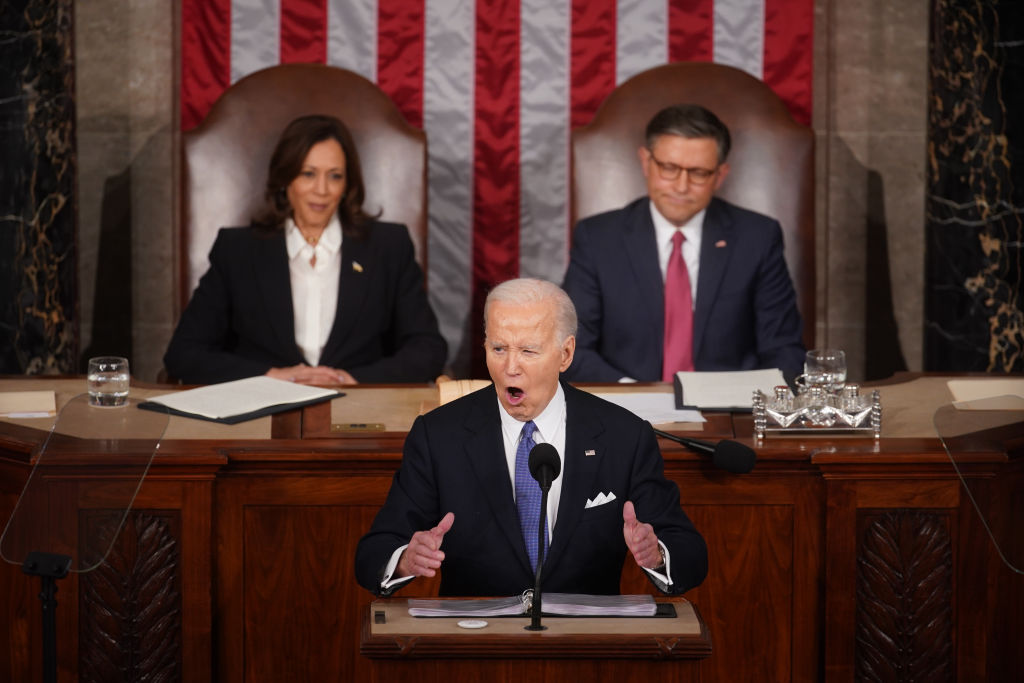President Joe Biden delivered the annual State of the Union address on Thursday. Speaking for roughly one hour in front of Congress and a variety of top-ranking government officials, the president laid out a series of accomplishments, contrasted himself with his “predecessor” and argued with Republicans about issues from Jan. 6 to border control.
Voting Rights and Foreign Aid
Throughout Biden’s speech, he touted his administration’s accomplishments, such as economic recovery, while setting an agenda going forward. Domestically, Biden yet again pushed for passage of the John Lewis Voting Rights Advancement Act; failure to pass the law has been seen by Black voters as one of the administrations major failures. Biden spoke of the late Congressman Lewis as a friend and noted the recent anniversary of the 1965 March in Selma in which Lewis and others – including Bettie May Fikes, the “Voice of Selma,” who was in the audience – were beaten by police; the Voting Rights Act of 1965 was passed later that year. In terms of international policy, Biden renewed his call for Congress to approve new aid for Ukraine in its war against Russia. He also criticized Israel for the high civilian death toll and suffering in its war in Gaza and announced new efforts by the U.S. to deliver aid to Gazans, though Biden did not call for a permanent ceasefire as some had hoped.
Calling out ‘my predecessor’
This year’s State of the Union comes as Biden prepares for a rematch against former President Trump in November’s election. Although Biden never called out Donald Trump by name, he made multiple references throughout the speech to “my predecessor.” He called out Trump as a threat to democracy who caused the January 6 insurrection, blamed him for the Supreme Court overturning Roe v. Wade and painted Trump as an ally of Russian President Vladimir Putin. Biden blamed the former president for the lack of border patrol – noting that Trump reportedly called Republicans in Congress and got them to refuse to vote for the tough bipartisan border policies that they had helped to write – and Biden urged Trump to cooperate with him to get the legislation passed. Overall, Biden painted a sharp contrast between himself and Trump, who he painted as a threat to the country who used hateful rhetoric and lies to divide the nation.
Heated exchanges with Republicans
In addition to calling out Trump, Biden also sparred with Republicans in the room, often calling them out or taking over their boos and heckling. At one point, Biden was interrupted by Republican Congresswoman Marjorie Taylor Greene, who shouted at him about Laken Riley, a young woman who was murdered by an undocumented immigrant who has become a symbol for conservative criticism of the administration’s immigration policies, who have coopted the #SayHerName campaign, created to highlight Black women victims of violence, for the Riley case. Biden responded by holding up one of the Republicans’ “Say Her Name Laken Riley” pins while expressing sympathy to the murdered women’s family. The president also stated that she was killed by “an illegal,” a turn of phrase that brought him criticism from progressive who object to dehumanize language against immigrants.
Overall, Biden’s speech was fiery and passionate, at times optimistic about finding unity and at times combative as he painted sharp differences between himself and Republicans. The speech set the agenda for the Biden administration going forward and gave a preview of the Biden campaign’s message as we get closer to Election Day.

